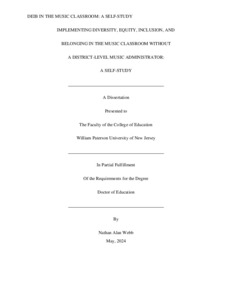Please use this identifier to cite or link to this item:
http://hdl.handle.net/20.500.12164/3442| Title: | Implementing Diversity, Equity, Inclusion, and Belonging in the Music Classroom Without a District-Level Music Administrator: A Self-Study |
| Authors: | Webb, Nathan Alan |
| Keywords: | Education;Community of practice;Culturally responsive teaching;Diversity Equity Inclusion and Belonging;Music education;Self-study |
| Issue Date: | May-2024 |
| Publisher: | William Paterson University |
| Abstract: | The purpose of this self-study was to investigate the implementation of diversity, equity, inclusion, and belonging (DEIB) in the music classroom without a district-level music administrator. With two guiding research questions, the study involved using culturally responsive music education and a community of practice to implement DEIB music lessons. Qualitative self-study research was the means of following action research principles and emphasizing self-reflection and improvement. The study occurred in a Northern New Jersey public middle school and included six participants: three administrators, two critical friends, and the researcher as a primary participant. Data collection methods included journaling, administrative interviews, and lesson plans triangulated through the literature. The study produced three key conclusions. First, cultural exploration significantly influenced DEIB implementation, supporting inclusivity and critical thinking. Second, reflective practices were an effective means of facilitating the DEIB lesson development and enhancing student comprehension of race and ethnicity, sexual and gender orientation, and disability and ability. Third, nonmusic administrators supported my ability to teach DEIB lessons, indicating the need for administrative advocacy. This study could provide a model for educators facing similar challenges. This research contributed to broader discussions on educational equity and inclusion. The study’s findings suggest all stakeholders should sustain DEIB implementation efforts in the music classroom and employ dedicated music administrators in every school district with music educators. These recommendations indicate how to foster inclusive and equitable music education practices, create culturally responsive learning environments, and promote educational social justice. |
| URI: | http://hdl.handle.net/20.500.12164/3442 |
| Appears in Collections: | Theses & Dissertations |
Files in This Item:
| File | Description | Size | Format | |
|---|---|---|---|---|
| Webb_MusicClassroomDEIB.pdf | 751.89 kB | Adobe PDF |  View/Open |
Items in DSpace are protected by copyright, with all rights reserved, unless otherwise indicated.
